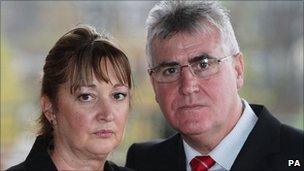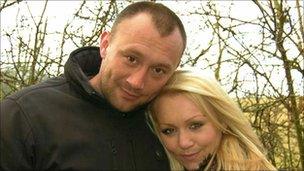War horrors 'made our Danny ill'
- Published
Danny Fitzsimons speaking on Saturday 26 February: ''They should have accepted the psychiatric reports''
The family of a British security guard jailed for 20 years in Iraq after he was convicted of killing two colleagues say he was traumatised by the horrors of war.
As a boy, Danny Fitzsimons wanted nothing more than to follow in his father Eric's footsteps and join the armed forces.
In 1997 he enlisted in the Army, aged 16, and shortly after his 18th birthday headed off to Kosovo on his first tour with the Royal Regiment of Fusiliers.
What happened next, say his family, laid the foundations for the mental health problems which led him to shoot dead two fellow security guards in Baghdad in August 2009.
Fitzsimons' stepmother Liz said while in Kosovo he discovered the dismembered body of a boy who used to bring him food, with traumatic consequences.
'Body pieces'
"Danny made friends with a young boy who used to bring him bread, and they gave him chocolate in return," she told the BBC.
"The Serbs saw this boy as a collaborator and cut his body up. They put the body pieces in the drinking water of the armed forces.

Liz and Eric Fitzsimons say Eric's son should never have been hired as a contractor in Iraq
"When you're only 18 yourself, it's so hard to envisage anything like that. Danny used to go on about it all the time to his dad.
"The last time his dad saw him was on Christmas Day 2008. Danny had a drink and a row and we thought, 'that's typical Danny being difficult'. We now know it was Danny with post-traumatic stress disorder (PTSD)."
Speaking earlier this year, she said the atrocities he witnessed had played a "huge part" in the mental illness he now suffered.
As a soldier, his unit uncovered mass graves in Kosovo, and later as a security guard in Iraq, he was forced to watch while his friend burnt to death in a truck screaming for his help.
The vehicle in front of him in his convoy was hit by a bomb, which sealed the plastic doors shut in the heat. Fitzsimons was unable to break the window of the truck as it was bulletproof glass.
Drunken row
Fitzsimonds also served tours in Bosnia, and later as a paratrooper in Northern Ireland, Macedonia and Afghanistan.
Fitzsimons, 30, left the Army in 2005 after eight years' service, and was hired by British private security firm ArmorGroup in 2009 and sent out to Iraq.
Within 36 hours of arriving in the capital, he would kill Paul McGuigan, from Peebles in the Scottish Borders, and Australian Darren Hoare, both 37, after a drunken row.
Mr McGuigan, a former Royal Marines commando, had a son and was about to become a father for a second time.
Father-of-three Mr Hoare, from Queensland, had served in Iraq in the Royal Australian Air Force before becoming a private security contractor.
At the centre of the murder trial was Fitzsimons' account that he acted in self-defence after being pinned down and beaten up.
The claim has been fiercely denied by Mr McGuigan's family.
They say a post-mortem examination of the two dead men showed they had been shot at close range with no signs of injuries caused by a fight.
Mr McGuigan's mother, Corinne Boyd-Russell, said her son's killer had shown no remorse.
In a written statement, she said: "Everybody is responsible for their own actions and even if Danny Fitzsimons did have PTSD, it should not be used as an excuse."
Mr McGuigan's fiancee, Nicola Prestage - who was pregnant with his baby Elsie-Mai at the time of his death - described the attack as "unprovoked".
Their daughter was born in October 2009, five weeks early.

Mr McGuigan and Ms Prestage were due to wed last year
In the same, joint statement, she said: "I gave birth to Paul's daughter without him by my side. A beautiful baby girl who will never see her daddy, or receive a cuddle from him.
"Two weeks after her birth, I had to take her to her daddy's funeral."
Ms Prestage had been talking to Mr McGuigan on an internet telephony service just an hour before he was killed.
Liz and Eric Fitzsimons, from Whitworth in Rochdale, say Eric's son should not have been working as a contractor in Iraq without a proper medical assessment.
ArmorGroup has admitted his screening was not completed in line with company procedures but also claimed Fitzsimons falsified information during the recruitment process.
Clive Stafford Smith, director of the human rights legal charity Reprieve, said: "Nothing I can say can take away the tragedy of the victims.
"But it is also very important to recognise that Danny Fitzsimons was a huge victim himself."
Bob Paxman, a former SAS soldier who founded the PTSD charity Talking 2 Minds, said people reacted in different ways to trauma and Fitzsimons' case was an extreme one.
He said: "As well as more former soldiers, we are seeing increasing numbers of people working in the security sector, where the pressures are higher because they have less back-up."
Fitzsimons was the first Westerner to be tried by an Iraqi court since the war began in 2003.
It followed the lifting of an immunity deal in 2009 preventing foreign nationals being charged with criminal offences.
- Published28 February 2011